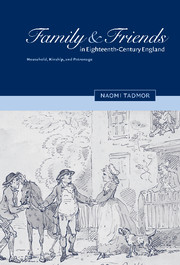Book contents
- Frontmatter
- Contents
- Acknowledgements
- A note on the text
- List of abbreviations
- Introduction
- 1 The concept of the household-family
- 2 The concept of the household-family in novels and conduct treatises
- 3 The concept of the lineage-family
- 4 The language of kinship
- 5 Friends
- 6 Political friends
- 7 Ideas about friendship and the constructions of friendship in literary texts
- Conclusion
- Bibliography
- Index
7 - Ideas about friendship and the constructions of friendship in literary texts
Published online by Cambridge University Press: 30 July 2009
- Frontmatter
- Contents
- Acknowledgements
- A note on the text
- List of abbreviations
- Introduction
- 1 The concept of the household-family
- 2 The concept of the household-family in novels and conduct treatises
- 3 The concept of the lineage-family
- 4 The language of kinship
- 5 Friends
- 6 Political friends
- 7 Ideas about friendship and the constructions of friendship in literary texts
- Conclusion
- Bibliography
- Index
Summary
Introduction
The broad spectrum of ‘friendship’ relationships, which were seen in the previous chapters to have played such an important role in the life of an eighteenth-century individual such as Thomas Turner and in the lives of so many people around him, also played an important role in contemporary cultural production. There were novels, essays, sermons, and diverse other literary texts which were preoccupied with friendship both directly and indirectly. For instance, Elizabeth Singer Rowe's Friendship in Death, first published in 1728, was one of the most popular works in the eighteenth century, printed in twenty-six editions by 1790. Sarah Fielding's The Adventures of David Simple, Containing an Account of his Travels Through the Cities of London and Westminster in Search of a Real Friend, first published in 1744, also continued to be reprinted until the end of the eighteenth century. Other well-known works such Joseph Andrews, Peregrine Pickle, Clarissa, or The Vicar of Wakefield presented a range of friendship relationships, explored interactions among friends, praised good friendship – and condemned false and evil friends.
It is not surprising that such literary texts were preoccupied with the issue of friendship. As we have seen in the previous chapters, in seventeenth- and eighteenth-century England friendship encompassed a broad and extremely important spectrum of relationships, including kinship relationships, sociable relationships, occupational relationships, and even political connections and patronage. There can, therefore, be little wonder that literary works also dwelled upon such ties.
- Type
- Chapter
- Information
- Family and Friends in Eighteenth-Century EnglandHousehold, Kinship and Patronage, pp. 237 - 271Publisher: Cambridge University PressPrint publication year: 2001



